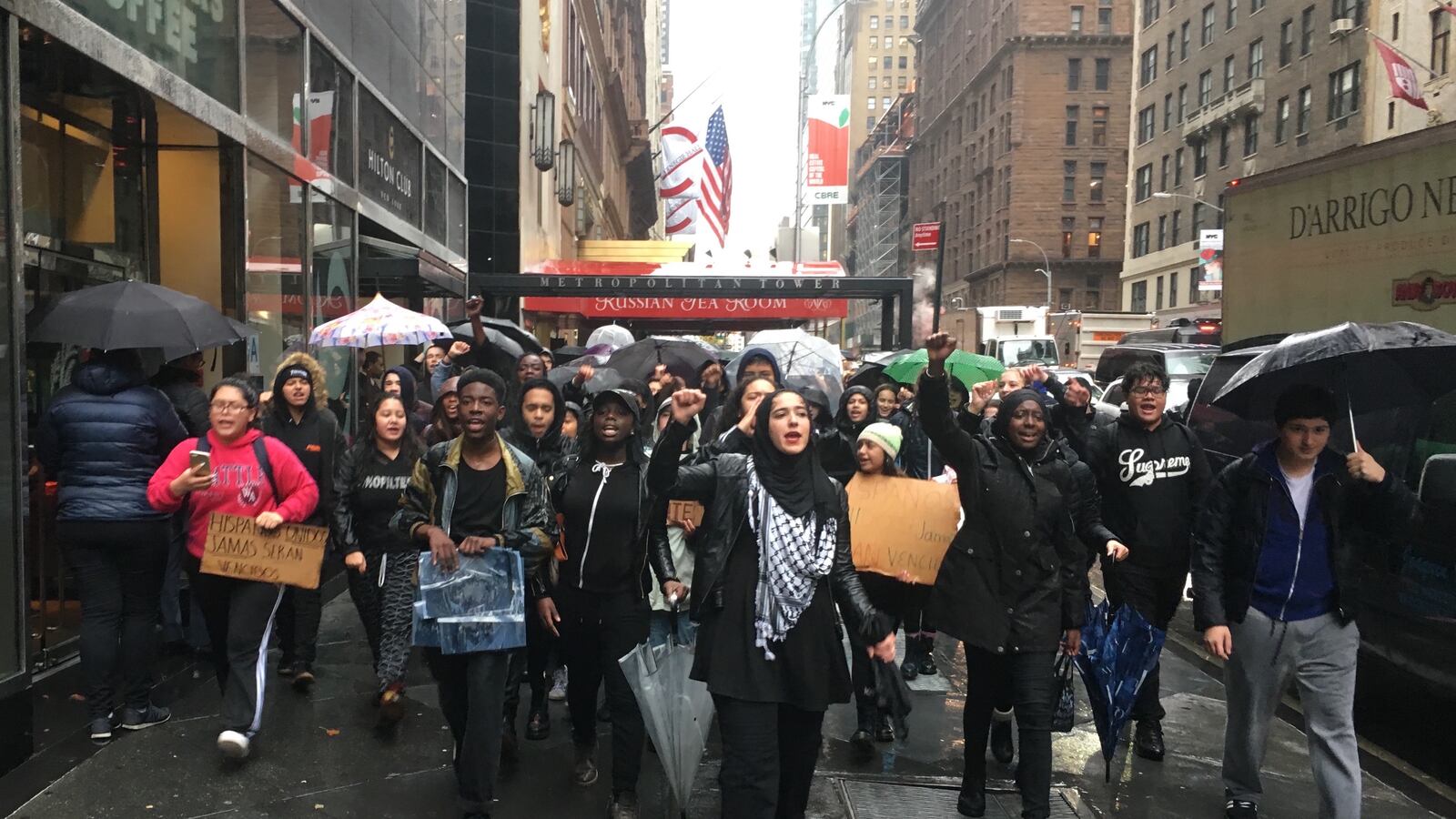In the Bronx, students will march to call for more guidance counselors in schools — not cops. In Manhattan, they will rally at a U.S. senator’s office and demand stricter gun laws. And in Brooklyn, teens will demonstrate at Borough Hall, even if it means risking discipline once they return to school.
Beginning at 10 a.m. Wednesday, thousands of students from across New York City are expected to flood the streets as part of a nationwide school walkout in response to last month’s school shooting in Parkland, Florida.
Their reasons for taking to the streets are diverse. In a state that already has strict gun laws, some want to push for national change. Others say they’re frustrated with the solutions that adults have offered, such as arming teachers or relying more heavily on metal detectors.
What unites them is a desire to honor the 14 teenagers and three teachers who were gunned down at Marjory Stoneman Douglas High School one month ago.
“I think it’s important to remember the people who died in the Florida shooting,” said Andrea Colon, a senior who is organizing a walkout at Rockaway Park High School in Queens. “But I think it’s also important that the nation’s reaction isn’t to put more police in or more metal detectors in.”
At some schools, the protests will last only 17 minutes — to honor each of the Parkland victims — but others will stretch on through the afternoon. At Brooklyn Technical High School, one of the city’s most prestigious high schools, students plan to join peers from other schools in a march to Borough Hall. In the Bronx, students from multiple campuses will converge at local Department of Education offices to call for more “restorative” discipline approaches such as mediation, rather than suspensions.
“This is the first time a protest is so relevant to me and people my age,” said Amira Shimin, a freshman who helped organize the Brooklyn Tech walkout. “I want gun control because I don’t want to go to school and be afraid.”
Here is what students say is motivating them, and the changes they want to see.
“I felt like police officers aren’t there to be your friends or your counselors.”
Sagar Sharma, the student body president at John Bowne High School in Queens, said he is walking out in part to protest the use of metal detectors at his school — and call attention to the different ways schools across the city are policed.
Metal detectors became a permanent fixture at John Bowne after two high-profile incidents last year. In April, a 16-year-old was stabbed at the school. In November, two students were found with guns.
After the stabbing, police officials were brought into the school and antagonized students, Sharma said, calling students “John Bowne stabbers” as they walked in. (Mayor Bill de Blasio called the behavior “unacceptable” when students told him about it during a town hall meeting on school safety last week.)
“That’s when I felt like police officers aren’t there to be your friends or your counselors,” Sharma said. “I just think it’s unfair for students to go through this every day — it creates a stigma at the school.”
“I have a little brother, and I don’t want to think about that happening to him.”
At the Academy of American Studies in Queens, the student council is helping to organize an event in the school’s courtyard, said Nuzhat Wahid, one of the student organizers of the event. Students at the school researched the 17 victims in the Parkland shooting and will hang short biographies of each student and teacher on the fence outside of the school. Then, they plan to release 17 orange balloons to commemorate the victims.
The event is likely to be particularly poignant for one student at the school, Wahid said, who knew two of the victims in the Parkland shooting. For Wahid, a high school senior, the event is a chance to stand against the possibility of something similar happening to her loved ones.
‘I’m going to graduate high school and I won’t have to think about an individual coming into my school and hurting others,” she said. “But I have a little brother, and I don’t want to think about that happening to him.”
“I thought, ‘I can be a part of this change.’”
Shimin was in fourth grade when a gunman stormed Sandy Hook Elementary School in Connecticut, killing 26 students and teachers.
“From that point on, lockdown drills were this very serious thing,” Shimin said. “I had this idea that anyone could come in and shoot.”
Now Shimin is a freshman at Brooklyn Tech, where she has helped organize her classmates for the walkout. Brooklyn Tech is the largest city high school at nearly 6,000 students, and students plan to line the block around their school, holding posters and chanting. Some will return to class, but Shimin and others plan to head to Borough Hall for speeches and more demonstrations.
She admits some of her classmates didn’t feel like they needed to join the debate since New York already has strict gun laws. But she felt compelled to support the Parkland students in their call for national action.
“They were saying this is never going to happen again and that inspired me,” Shimin said. “I thought, ‘I can be a part of this change.’”

